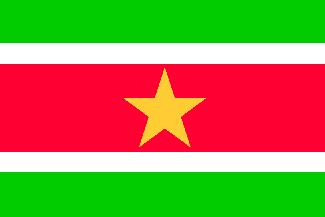 |

|
February / March 2020 |
Thursday 27 February 2020
We take the metro to Central Station and we are just in time to take
the 8:11 IC Direct service to Amsterdam Airport Schiphol. Once there we
have to join a long line in order to drop off the luggage. After that
the security check goes quite smoothly. We drink coffee at Starbucks and
then go to gate E24 for our
KLM flight to Paramaribo.
The flight is going well. A few bumps of turbulence and we arrive at J.A.
Pengel International Airport, or Zanderij with a small delay of 20
minutes. The immigration service works very slowly. Only three counters
are open, one for Surinamese and Caricom citizens, one for VIPs and 60+
and a third for the rest. We stand in line for 45 minutes and we were
lucky enough to be far towards the front of the line. The suitcases are
already off the belt when we are through immigration and we can go
outside. Our reserved taxi from De
Paarl taxi is ready and waiting. The drive to Paramaribo
takes 40 minutes and we arrive at our hotel Palacio
at 6.30 pm. The hotel is simple, but neat and clean. The staff is very
friendly.
We are still hungry, but not much energy to find a restaurant. Therefore
we go to the Burger King a few doors away from the hotel.
After that we go to bed early.
Friday 28 February 2020
We have breakfast at 8am. The breakfast is good. No special things, b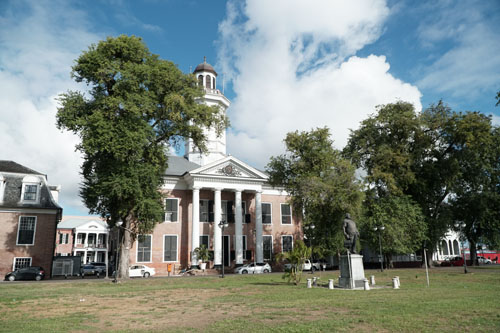 ut
everything that has to be there is there and tastes good. After
breakfast we explore the city. We walk along the Heerenstraat, the Henck
Arronstraat to the Independence Square. There are a number of colonial
buildings, such as the courthouse and the Ministry of Finance. The
latter with its Greek columns was once the town hall. In front of the
building is a statue of Jopie Pengel, a political leader and Prime
Minister of Suriname in the 1960s, when Suriname was still an autonomous
part of the kingdom of the Netherlands. Diagonally opposite those
buildings is the Presidential Palace, once built as the residence of the
Dutch governor, but since 1975 the palace of the president, currently
the infamous Bouterse.
ut
everything that has to be there is there and tastes good. After
breakfast we explore the city. We walk along the Heerenstraat, the Henck
Arronstraat to the Independence Square. There are a number of colonial
buildings, such as the courthouse and the Ministry of Finance. The
latter with its Greek columns was once the town hall. In front of the
building is a statue of Jopie Pengel, a political leader and Prime
Minister of Suriname in the 1960s, when Suriname was still an autonomous
part of the kingdom of the Netherlands. Diagonally opposite those
buildings is the Presidential Palace, once built as the residence of the
Dutch governor, but since 1975 the palace of the president, currently
the infamous Bouterse.
We continue to Fort Zeelandia. This fort dates from the 16th
century, when it was built by the first English governor Willoughby to
control the entrance of the Suriname river. The Dutch bombed the
fortress and took it over. They then renamed the fort Zeelandia, named
after their main ship and their home Province of Zeeland. The Dutch were
subsequen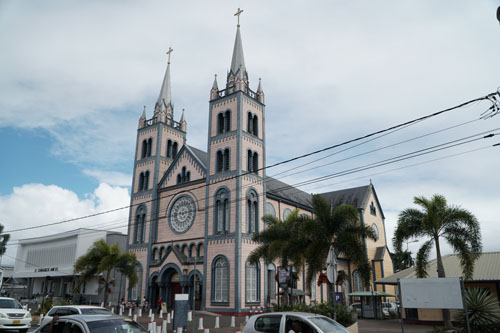 tly
driven out again, but after the Second English War and the peace of
treaty of Breda in 1667, England and the Republic swapped New Amsterdam
(New York) and Suriname. A good deal at the time, as Suriname was a
fertile colony, whereas New Amsterdam's potential was not as evident
back then .
tly
driven out again, but after the Second English War and the peace of
treaty of Breda in 1667, England and the Republic swapped New Amsterdam
(New York) and Suriname. A good deal at the time, as Suriname was a
fertile colony, whereas New Amsterdam's potential was not as evident
back then .
We continue to the Palm Garden, behind the Presidential Palace. This was
the government's vegetable garden, and many of the palms date back to
the 17th century. They were imported from Cuba. Now it is a public park.
We walk into Henck Arronstraat past the Episcopal
Palace (and a Roman Catholic Primary School) and arrive at the Basilica
of Paul and Peter, the largest wooden building in the Western
Hemisphere. A beautiful wooden building from 1887, painted light yellow
on the outside. The interior is unpainted and shows the wood grain
nicely. All sculptures are also wood carvings, just like the Stations of
the Cross along the outer walls. The pipe organ has unfortunately been
dismantled. 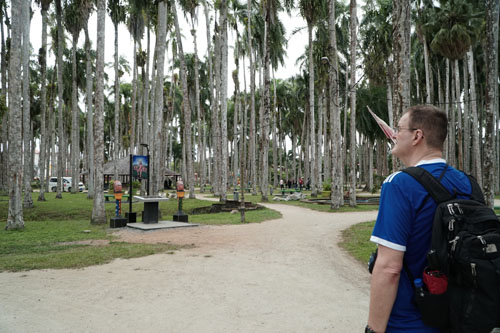 Funds
are being raised fort its restoration.
Funds
are being raised fort its restoration.
Then we walk to the former Land's Hospital. A hospital complex dating
back to a 17th century military hospital, which was opened to the public
in 1821. The Ministry of Health is now located here. We walk on to the
synagogue Neve
Shalom. In 1723, this house of prayer was ready for the
Ashkenazi Jews from central Europe. Meanwhile, Sephardic Jews from
Portugal also gather here, because their community is too small for
their own synagogue. Right next to it is the Keizerstraat
Mosque of the Lahore Ahmedya movement in Suriname. Both buildings cannot
be visited. We walk further into the center through the Domineestraat, a
busy shopping street with Hotel Krasnapolsky and the former Kersten shop
(descendant of the Moravian Lutherans, also known as Hernhuters) and
then walk to the Central Market Hall. It is very busy there.
Vegetables, fruit, fish and meat are the most important commodities. Cut
fresh for you. Live chicken are also on sale.
Then we walk to a sandwich shop 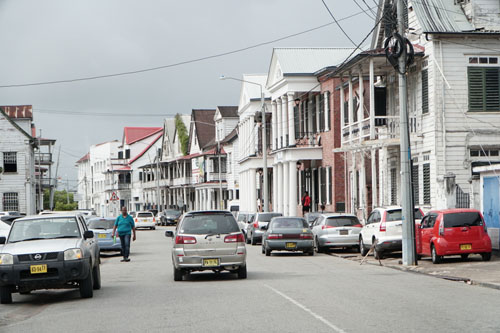 on
the Heerenstraat, opposite the Samson House. A free black woman
Elisabeth Samson lived here from 1850 to 1871, who became a successful
businesswoman in the 18th century and who after a long legal process in
the Netherlands was allowed to marry a white man.
on
the Heerenstraat, opposite the Samson House. A free black woman
Elisabeth Samson lived here from 1850 to 1871, who became a successful
businesswoman in the 18th century and who after a long legal process in
the Netherlands was allowed to marry a white man.
Later in the day we want to visit the Suriname museum in Fort Zeelandia,
but that closes at 2 pm (and is also closed on Saturday!)
In the evening we drink a cocktail at P&G
Lounge. After that we dine in Bar Bodega De Waag, in the old
Weighing building on the Waterkant (Waterfront).
Weather: tropical warm. Partly cloudy 31 degrees
Saturday 29 February 2020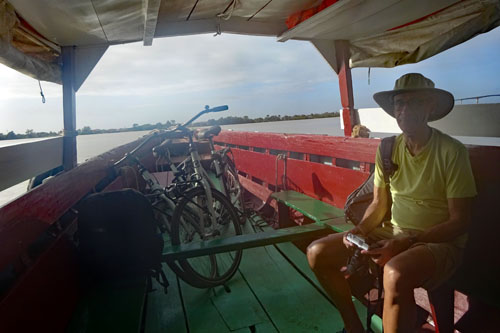
After a very long and deep sleep we have breakfast at 8am. After
breakfast we walk to Fietsen
in Suriname to rent a bicycle. On the rental bike we ride to the
ferry jetty at Plattebrug and we cross with the bicycles to Meerzorg.
Cyclists rent their own boat, pedestrians have to wait until a boat is
full. On the other side we cycle to the Peperpot
Nature Park. There we walk the path through the jungle.
Peperpot is a former plantation - one of the oldest in Suriname - that
has been abandoned. Nature took over the land and now many bird and
monkey species can be found here. Since 2009 it has been managed as a
reserve by a foundation. The birds are letting us down a bit, but we do
see a number of squirrel monkeys. After the walk we cycle back towards
the ferry. We eat at a Chinese eatery on the way. Like there are so many
on this side of the river. It is a grim setting. The staff and kitchen
are behind bars and t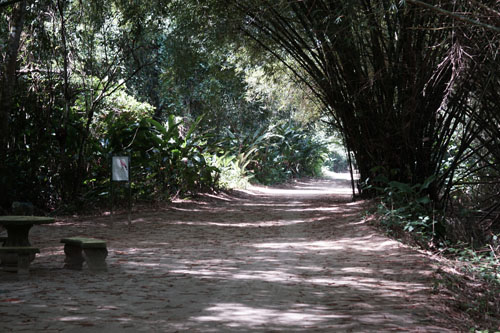 he
dining room is rather bare. The meals are fine.
he
dining room is rather bare. The meals are fine.
Back at the hotel we rest. At 4 pm we go on an excursion to the Sea
Turtles at Braampunt. We booked the tour with Orange
Travel. Our guide is called Daniel and we meet him on the terrace
of café 't Vat opposite Hotel Torarica. We first take the bus to
Leonsberg. From there we sail down the Suriname River by boat. Daniel, a
biologist, tells us all we need to know on the way there. Where the
Suriname and Commewijne rivers meet, there are many dolphins, which come
here to hunt fish. We see quite a few dolphins. Braampunt is a headland
with a sandy beach on the ocean side. We go ashore and first walk
around. Then we eat on board the surinam-indonesian speciality roti
brought by Daniel and wait for darkness. It falls around half past
seven. It is then completely dark and we go looking for the turtles, who
come here to lay their eg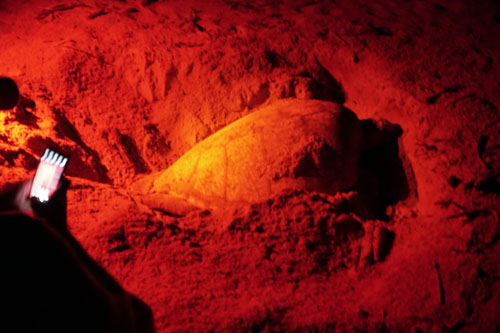 gs
on the beach at this time of the year. Within the shortest time we see a
Green Sea Turtle come ashore. We have to wait more than half an hour
before the turtle has dug in and is going to lay. The guide shows us
with a red lamp. The turtle does not see a red light, so we do not
disturb it. The eggs remain under the sand for two months and then the
young ones have to see for themselves how they get into the sea. Only 1%
reach adulthood. When they do, they can live up to 130 years. It is a
special experience. After fifteen minutes the turtle is ready and we can
go home. We arrive at the hotel around ten o'clock.
gs
on the beach at this time of the year. Within the shortest time we see a
Green Sea Turtle come ashore. We have to wait more than half an hour
before the turtle has dug in and is going to lay. The guide shows us
with a red lamp. The turtle does not see a red light, so we do not
disturb it. The eggs remain under the sand for two months and then the
young ones have to see for themselves how they get into the sea. Only 1%
reach adulthood. When they do, they can live up to 130 years. It is a
special experience. After fifteen minutes the turtle is ready and we can
go home. We arrive at the hotel around ten o'clock.
Sunday 1 March 2020
We walk to the Torarica Hotel and have coffee there at Tangelo, their cafetaria. Then we visit the Suriname museum in Fort Zeelandia. A large collection of historical objects tell the story of the colonization. There is also a memorial that recalls the December murders of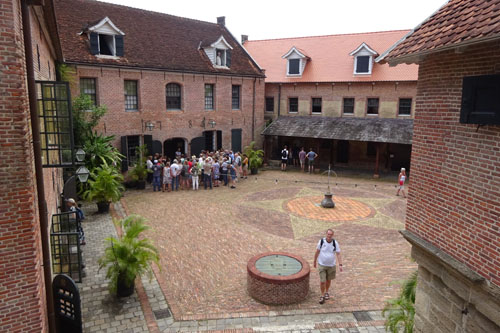 1982. In that month, Commander Bouterse had 15 opponents killed in the
Fort, which served as his headquarters. Bouterse was convicted of these
murders last year, but the appeal has yet to serve. After the museum visit
we walk along the Waterkant and have a drink, while we can watch a live
report on TV of PSV-Feyenoord football match back home. It ended in 1-1
draw. The center of Paramaribo is quite deserted on Sunday. Almost
everything is closed. We have lunch at McDonalds.
1982. In that month, Commander Bouterse had 15 opponents killed in the
Fort, which served as his headquarters. Bouterse was convicted of these
murders last year, but the appeal has yet to serve. After the museum visit
we walk along the Waterkant and have a drink, while we can watch a live
report on TV of PSV-Feyenoord football match back home. It ended in 1-1
draw. The center of Paramaribo is quite deserted on Sunday. Almost
everything is closed. We have lunch at McDonalds.In the evening we drink a cocktail in Torarica and then we eat at Bar Zuid on the Van Sommelsdijkstraat.
Weather: sunny, 30 degrees
 |
Other Travel |  |
| back | continue |